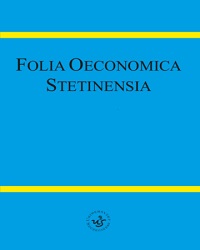Modelling Unpaid Housework Time in Poland on the Basis of a Time Use Survey
Modelling Unpaid Housework Time in Poland on the Basis of a Time Use Survey
Author(s): Marta Hozer-Koćmiel, Wojciech KuźmińskiSubject(s): National Economy, Labor relations, Socio-Economic Research
Published by: Wydawnictwo Naukowe Uniwersytetu Szczecińskiego
Keywords: Unpaid household work; Time Use Survey; Multivariate Regression;
Summary/Abstract: Research background: The paper introduces an econometric analysis of unpaid household work in Poland. Purpose: The purpose is a quantitative analysis of the relations between the time spent on unpaid housework and some selected demographic, economic and social variables. Research methodology: In the survey, the respondents were grouped by gender and type of locality. It was hypothesized that there are strong differences in the determinants of housework time by gender and type of locality. Multiple regression models for housework time and 23 demographic, social and economic variables were estimated and verified. The analysis was conducted on the basis of individual data from the Time Use Survey conducted by the Statistics Poland in 2013. Results: The empirical study found no differences in the key determinants of housework time between women and men depending on the type of locality. The main factors of influence were: paid work time, time spent meeting physiological needs (sleeping, eating, washing), time spent on learning, the number of children and, finally, economic activity. Novelty: The theoretical part outlines barely known economic theories that addressed the issue of unpaid housework. The authors describe the care economy, humanistic economics, economics of happiness, time allocation theory as well as a two-dimensional approach to poverty research. Housework (which means the unpaid activity of household members aimed at satisfying the needs of individuals forming the household) has also been out of economic mainstream categories. Even though unpopular, it has an economic value and can be replaced by market goods and services or offered by the state. The authors have been persuaded that there are tangible and intangible benefits resulting from this type of work.
Journal: Folia Oeconomica Stetinensia
- Issue Year: 20/2020
- Issue No: 1
- Page Range: 177-189
- Page Count: 13
- Language: English

